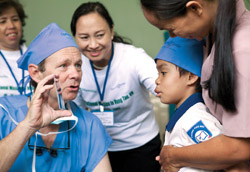Changing Lives, One Smile at a Time
There’s
no universal language as compelling as the smiling
face of a child. Just ask William
P. Magee Jr., MD ’72, a leading
plastic and craniofacial surgeon who has devoted
the past quarter century to putting smiles on
some 100,000 young faces around the globe.

|

William P. Magee
Jr., MD ’72, shows a child in Vietnam
his reflection. Magee is co-founder and
CEO of Operation Smile, which provides
free reconstructive surgery to indigent
children around the world with cleft lips,
cleft palates, and other correctable facial
deformities.
|
As co-founder and CEO of Operation Smile, he’s
transformed lives in more than 25 developing
countries, providing free reconstructive surgery
to indigent children with cleft lips, cleft
palates, and other correctable facial deformities.
Since establishing the not-for-profit volunteer
medical services organization in 1982 with his
wife, Kathleen, Magee has built a network of
thousands of dedicated surgeons and healthcare
professionals who donate their time, skills,
and expertise for a couple of weeks each year
to offer new life and hope to needy kids. Many
GW Medical Center alumni and faculty members
have served as Operation Smile volunteers over
the years, including John F. Williams, MD ’79,
EdD ’96, the University’s provost
and vice president for health affairs.
Operation Smile, which Magee says is as life
changing for the volunteers as it is for the
beneficiaries, was born of guilt, he says. “In
1982, Kathy and I traveled to the Philippines
with a team of medical volunteers from Houston,
Texas, to repair children’s cleft lips
and cleft palates,” he reflects. The scene
that greeted the couple haunted them long after
they returned home. “Hundreds of children
ravaged by life-threatening facial deformities
were waiting for us, their families begging
for help,” he states. Although they operated
on as many children as they could that week,
time and manpower constraints compelled them
to turn more than 250 children away. Before
boarding their plane for home, the Magees promised
that they would return as soon as they could
to help more children. “We solicited donations
of surgical equipment and supplies, assembled
a volunteer team, and went back the following
year, and the year after that, operating on
several hundred more kids, but continued to
turn hundreds away,” Magee says.
The mission increased in scope after Magee
received a letter from Mother Theresa asking
him to come to India to treat deformed children.
Numerous other requests for help began flooding
in from around the world. Before long, the Norfolk,
Va., resident was coordinating surgical missions
to places like Kenya, Colombia, and Vietnam,
and the list continues to grow each year.
A long-time proponent of experiencing the
world beyond your own borders, globetrotting
is nothing new to Magee. As a GW medical student,
he completed a three-month elective course in
Zurich, Switzerland with the renowned maxillofacial
surgeon Hugo L. Obwegeser. As a resident, Magee
received a Hays-Fulbright grant to study in
Paris for six months with Paul Tessier, widely
regarded as the father of craniofacial surgery.
“We had four young kids and another on
the way at the time, but he was the biggest
name in the world in craniofacial surgery, and
I couldn’t turn down the chance to study
with him,” Magee says. “It was a
monumental step in my life, because it set the
stage for my plastic surgery training, my practice,
and, ultimately, Operation Smile.”
The second oldest of 12 children, Magee grew
up in Fort Lee, N.J., where his father was one
of two family practitioners in town. “I
enjoyed watching how gently and well he interacted
with his patients and how much he loved medicine,”
Magee says. “Although I wasn’t much
of a student at the time, I was always pretty
sure that I would follow in his footsteps.”
Magee earned his bachelor’s degree at
Mount St. Mary’s College in Emmitsburg,
Md., and his dentistry degree at the University
of Maryland before applying to GW Medical School.
“GW is a great medical school that fosters
out-of-the-box thinking,” he states. “The
University’s excellence, coupled with
its location in an international city, made
it the perfect place for me to study medicine.”
He remains a consistent presence at his alma
mater, speaking to GW medical school graduates
several years ago, as well as at last year’s
White Coat ceremony for incoming medical students.
Magee says he derives great satisfaction from
“encouraging younger people entering the
profession to recognize that there’s power
in medicine and to step outside of the box to
become a real resource for their country. They’ll
find tremendous excitement and energy in sacrificing
a little bit of themselves for others in need.”
Humanitarian and distinguished service awards
have rained down on Magee, who has trained hundreds
of international physicians in advanced craniofacial
surgical techniques. Accolades, however nice,
pale in comparison to the joy he receives from
the simple act of helping these children. “It’s
transformational in the way you look at life,”
states Magee, whose ultimate goal is to raise
enough funds to establish medical centers throughout
the world to take care of children all year.
“We have the ability to conduct medical
diplomacy, regardless of nationality, religion,
culture, or creed, but simply because it’s
the right thing to do,” he says. “The
kids that we operated on during the first years
in the Philippines have now graduated from college.
One is now a singer, another is the coordinator
of Operation Smile’s Speakers Bureau.
Through Operation Smile, we have a chance to
take people who are literally imprisoned in
their own bodies and give them back their lives.
It’s incredibly powerful.”
—Jamie L. Freedman